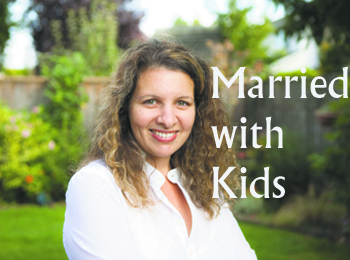One of the joys of being a parent is that for a short time, you epitomize perfection in your children’s eyes. As you scurry around trying to do your very best, they look up at you with utter admiration. Before them stands an adult who can answer any question, resolve any problem, make everything that’s wrong, right again. It’s humbling to see that trust and belief from your kids, because it reminds you what a powerful figure you are in their eyes – for a short time, anyway.
In a distant memory that goes back 35 years, I’m sitting in the bathtub with my little sister and we’re talking about our mother. “She’s the most beautiful woman in the world,” I say sagely, comparing her to other moms I know and to the women I’ve seen in James Bond movies. My sister agrees. To both of us, our mom is nothing short of a deity and we would do anything to win her praise and attention.
Walking past the bathroom door, my mother overhears this conversation and is filled with an overwhelming feeling of love for her two little girls. Beauty she doesn’t care for – she knows that’s something that comes and goes. But to be seen in such a light by the children who have invested all their trust, belief and hope in her is a special moment indeed.
It’s a short-lived one, because as they grow past the ages of six or seven, kids become more inclined to see their parents with a growing degree of objectivity. Criticisms become scathing, doors slam in loud objection and rules are hotly contested. The parent moves from deity to dictator and walks a fine line between effective parenting and reasonable restrictions. There’s a relatively short time to mould those kids into decent, respectful human beings, and as parents try to do so, the home can become a war zone of different viewpoints. Phrases such as “old-fashioned,” “out of touch” and “just plain mean” are tossed like grenades around the kitchen. It takes strength and conviction to withstand the barrage without second-guessing your rules and decisions.
Which is why the years from birth to age five need to be cherished so dearly. In my experience, that’s when parents are revered the most and the love they receive is at its purest and least adulterated.
“Is there anything dad can’t do?” my daughter, Maya, almost five, asked me recently. Her eyes were wide and her curiosity genuine. In her eyes, her dad is nothing short of brilliant, a man who can fix anything, soothe burning scratches and hurt feelings, eliminate hunger and lead with decisiveness.
Not sure what to say, I pointed to a few of his shortcomings. His cooking skills could be improved, I noted, and he’s not that good at cleaning up his clothes. But those are small things, I added. In the areas where it counts, her dad is a real treasure.
She snuggled up to me on the couch, thrilled to have a few private minutes of cuddle time. “I love you to the moon and the sun,” she declared. “Mom, I’m a big fan of you.” I folded her in a close embrace, knowing how precious this moment is and how little time I have until she starts examining my imperfections.
Her love and admiration is like a large puddle of sunshine in my life, and I want to bask in its warmth as long as I can.
